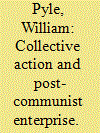|
|
|
Sort Order |
|
|
|
Items / Page
|
|
|
|
|
|
|
| Srl | Item |
| 1 |
ID:
071460


|
|
|
|
|
| Publication |
2006.
|
| Summary/Abstract |
Drawing on a unique set of surveys, this article explores the question of whether Russia's post-communist business associations are generally antithetical to or supportive of the broad objectives of economic restructuring. Contrary to the most widely cited analysis as to the purposes of collective action in the business community, the survey evidence demonstrates that association members have embraced market-adapting forms of behaviour at greater rates than non-members. The responses of both firms and associations, moreover, suggest that the associations themselves are, at least in part, directly responsible. These findings point to the conclusion that in contemporary Russia the net returns to collective action in support of market development are high relative to those for purposes that are less supportive.
|
|
|
|
|
|
|
|
|
|
|
|
|
|
|
|
| 2 |
ID:
071461


|
|
|
|
|
| Publication |
2006.
|
| Summary/Abstract |
Changes in elite composition during the post-Soviet transition in Russia and Central and Eastern Europe have received significant scholarly attention, but corollary developments in other former 'Communist' countries, including Kazakhstan, have attracted much less scrutiny, or have been attributed to organic features of Central Asian society. We examine the trajectory of the Kazakhstan elite in the light of three key perspectives on elite transformation: the first claims that the country has reverted to traditional clan social structures, the second proposes the conquest of power by a nascent 'acquisition class', and the third argues that the Soviet-era elite was largely successful in maintaining power during the economic reorganisation. We find that Kazakhstan's experience most closely matches the third explanation.
|
|
|
|
|
|
|
|
|
|
|
|
|
|
|
|
| 3 |
ID:
071462


|
|
|
|
|
| Publication |
2006.
|
| Summary/Abstract |
Apart from its role in the Moscow show trials during 1936 - 38, the Military Collegium of the USSR Supreme Court under V.V. Ul'rikh also tried some 40,000 'enemies of the people' behind closed doors, sentencing most of them to death. These pseudo-trials of no more than a few minutes took place in prisons or NKVD offices in Moscow or (through the Collegium's assizes) provincial centres. There was no serious investigation of the evidence, and the court turned a blind eye to apparent cases of torture. The judges personally attended executions, occasionally even participating in them. The punishments had been determined beforehand by the political leadership under Stalin by way of lists, with the Military Collegium only 'legalising' the sentences. The defendants originated from the Soviet elite. The aim of this article is to throw more light on this side of the Collegium's activities, mainly based on archival sources. The article suggests that this quasi-legal procedure was adopted by the leadership under Stalin, in preference to purely administrative measures, because it was considered to be less likely to endanger the elite's loyalty. We did not break the law, did not sign just like that. These are lies. Ul'rikh gave reports. There was a court, an indictment, there were sentences: everything as it should be, everything according to the law (Lazar' Kaganovich interviewed by G.A. Kumanev in Kumanev 1999, p. 116).From an organ of justice, [the Military Collegium] was turned into an appendage of the power apparatus, a weapon of arbitrary rule and lawlessness, a terrible machine of mass repressions [Soviet military jurists N. Chistyakov and V. Maslov (1991, p. 76)].
|
|
|
|
|
|
|
|
|
|
|
|
|
|
|
|
|
|
|
|
|